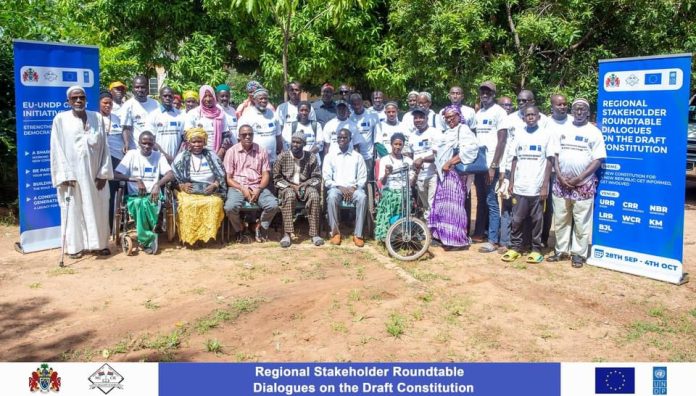By Mustapha Jallow
As the Gambia craves for a new constitution that is suitable to its democratic norms and values, officials of the National Council for Civic Education (NCCE) in partnership with UNDP, have urged Gambian citizens to participate in the stakeholders’ dialogue and have a say in the gazetted draft constitution.
This is an EU-UNDP “Great Initiative’’ under the theme: “A New Constitution for a New Republic: Get Informed, Get Involved,” which aims to spur effective and increased citizen participation in the constitutional building process.
It is also part of a wider awareness creation campaign on the gazetted draft Constitution, ahead of its tabling at the National Assembly since the majority of Gambians say the country needs a new Constitution.
The dialogue was attended by diverse key stakeholders in public institutions, regional authorities, civil society organizations, PWDs, Women, Youths, community religious leaders in all targeted regions, Upper River, Central River, North Bank, Lower River, West Coast, Greater Banjul Area, across the country.
In his remarks in Basse-URR, Yusupha Bojang, the chief civil education officer for NCCE thanked Gambians for showing interest in having a new constitution. He explained how the government also committed along with its development partners in supporting the journey process of a new constitution.
“Constitution building involves everybody,’’ he tells Basse people. He added: “And to say whether you want this constitution or you don’t want it; you need to know what is in that constitution.’’
He further views this dialogue as important and says it will add value to the discussions to be held at the country’s parliament. He said this also prompted NCCE to begin its engagement at the level of the regional authorities before they move to the villages.
Bojang sees the idea of throwing the constitution out as an “extremist” act, arguing that it is the responsibility of lawmakers to take time and review the draft clause-by clause and see what actually allies the aspirations and interests of the Gambian people – and bring it back for a referendum.
Therefore, he says: “We need your participation, so we can formally submit our complaints and concerns to have a constitution that we all desire.’’
Abubacarr M. Danjo, the vice chairman for the Basse Area Council said: “The process of drafting a new constitution is a historic moment, one that allows us to collectively shape the future of our nation, ensuring that it reflects the values, aspirations, and hopes of all Gambians.’’
This draft constitution, he added has rightfully become “the talk of the town,’’ saying it also seeks to address critical issues of governance, human rights, and development while ensuring that our laws are aligned with the needs of the people.
“I want to emphasize that this draft constitution is the result of a wide-reaching consultative process. Voices from all regions, including Base, have contributed to its development. The drafting process sought the input of men and women, youth and elders, from all walks of life. This inclusivity is key because the constitution belongs to the people, and it must reflect their collective will,’’ he says.
“We must recognize that a constitution is not simply about legal technicalities; it must capture the spirit of the nation, respect its diversity, and accommodate the evolving needs of future generations,’’ he told participants.
Maroya Sabally, a representative for the district chief described the dialogue as timely in enlightening citizens, especially those at the grassroots levels.
Soma Jallow, councilor for Basse Area Council urged her fellow women, particularly those in groups to listen attentively and relate the information to their colleagues.
Meanwhile, the roundtable dialogue continues across the regions of the country.


















